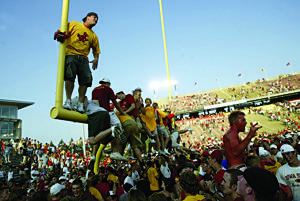FREDERICK: History loves the underdog, don’t fear the experts’ picks

FREDERICK: History loves the underdog, don’t fear the experts’ picks
September 11, 2008
Tomorrow is the big day: the Super Bowl of Iowa, the event some wait all year for — the CyHawk football game. With the spread predicted at 13.5 points — in favor of the Hawkeyes — perhaps some Cyclones fans are a bit down about our prospects in Iowa City. Who knew that predictable blowout victories over Maine and Florida International could make the Hawks look so imposing to some.
That aside, perhaps Cyclones could use a little refresher from the history books when it comes to being the underdog:
c. 1,020 BCE, Socoh, Judah — In an episode that lends its name to possibly every underdog victory to follow, shepherd boy David slings a stone at the Philistine giant, Goliath. The stone impales Goliath’s skull, killing him instantly. David hacks off Goliath’s head, and the Israelites and King Saul proceed to run the Philistines off. David goes on to become king of Israel and is portrayed 3,000 years later by a pint-sized asparagus sprout in the Veggie Tales video series.
Oct. 10, 732, Tours, France — Frankish forces, under Charles Martel, halt the Muslim invasion of Europe. Outnumbered more than 2-to-1, Martel’s highly trained troops destroy the Muslim force, saving Christendom from the immediate threat of destruction and making off with the Muslim treasure wagons. Martel is hailed as a hero. His grandson, Charlemagne, founds the Holy Roman Empire a few decades later.
Aug. 22, 1485, Leicestershire, England — Henry Tudor, in a last gamble to attain the English throne for the Lancastrians, lands in Wales with a small mercenary force. The Yorkist Richard III chose to meet him at Bosworth Field, a battle that sealed not only Richard III’s fate — he fell in the heat of battle, becoming the last English monarch to die in battle — but the fate of the House of York. Bosworth Field was the last major battle of the War of the Roses, and firmly settled the Tudors on the Throne of St. James. Henry Tudor was crowned as Henry VII, and the whole episode made for a tidy little play by Bill Shakespeare a century or so later, eventually becoming an HBO miniseries.
Aug. 8, 1588, English Channel near Gravelines, France — Outgunned English fleet lights several of their own ships on fire, send them into the Spanish fleet, and then sails circles around them, sowing death and destruction. Of the remaining ships, many are destroyed in bad weather while circumnavigating the British Isles. The disaster marks the last serious attempt at an invasion of the British Isles.
Jan. 22-23, 1879, Rorke’s Drift, South Africa — Attacked by between 4,000 and 5,000 native Zulu tribesmen, less than 150 British troops defend a miserable colonial hovel for two days until help arrives. The defense of Rorke’s Drift sets the stage for British military prowess for the next 70 years and has become a virtual synonym for valorous attention to duty in the name of “Queen and Country.”
Nov. 3, 1948, St. Louis, Miss. — Democrat Harry Truman stands at a podium in St. Louis’ Union Station, displaying a copy of the first edition of that day’s Chicago Tribune, whose massive banner headline proclaimed what had been his seemingly looming political obituary. As it turned out, Dewey did not defeat Truman, and was instead thoroughly trounced, 303 electoral votes to 189 electoral votes.
Sept. 12, 1998, Iowa City — Having lost an obscene number of Cy-Hawk football games in a row, the Cyclones stun sports fans statewide by defeating the Hawkeyes 27-9 at Kinnick Stadium. Oppressed Cyclone fans rejoice in their new-found ability to point and laugh at their black and gold counterparts, hold their heads high and do unto the Hawkeyes and their fans as the Hawkeyes and their fans had done unto them for far too long.
– Ryan Frederick is a senior in management from Orient.
















